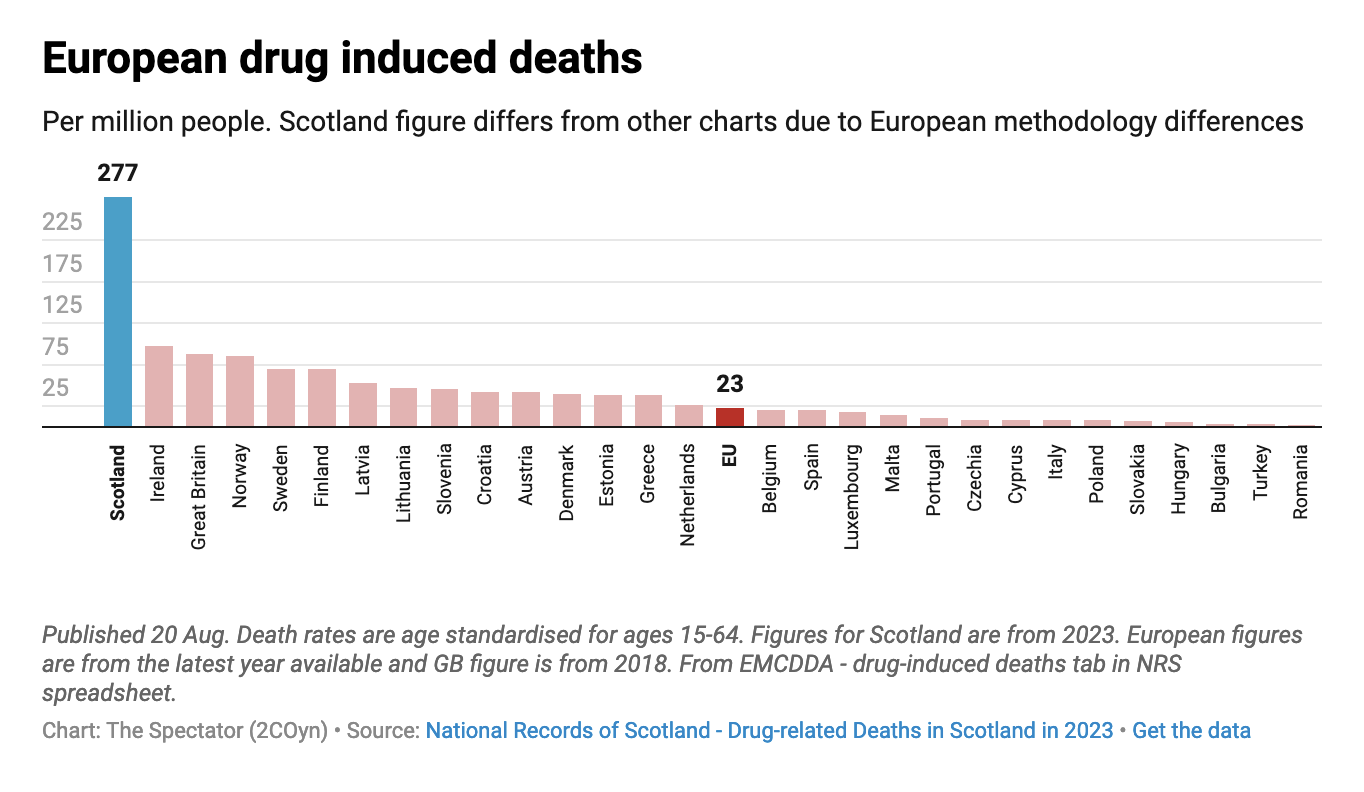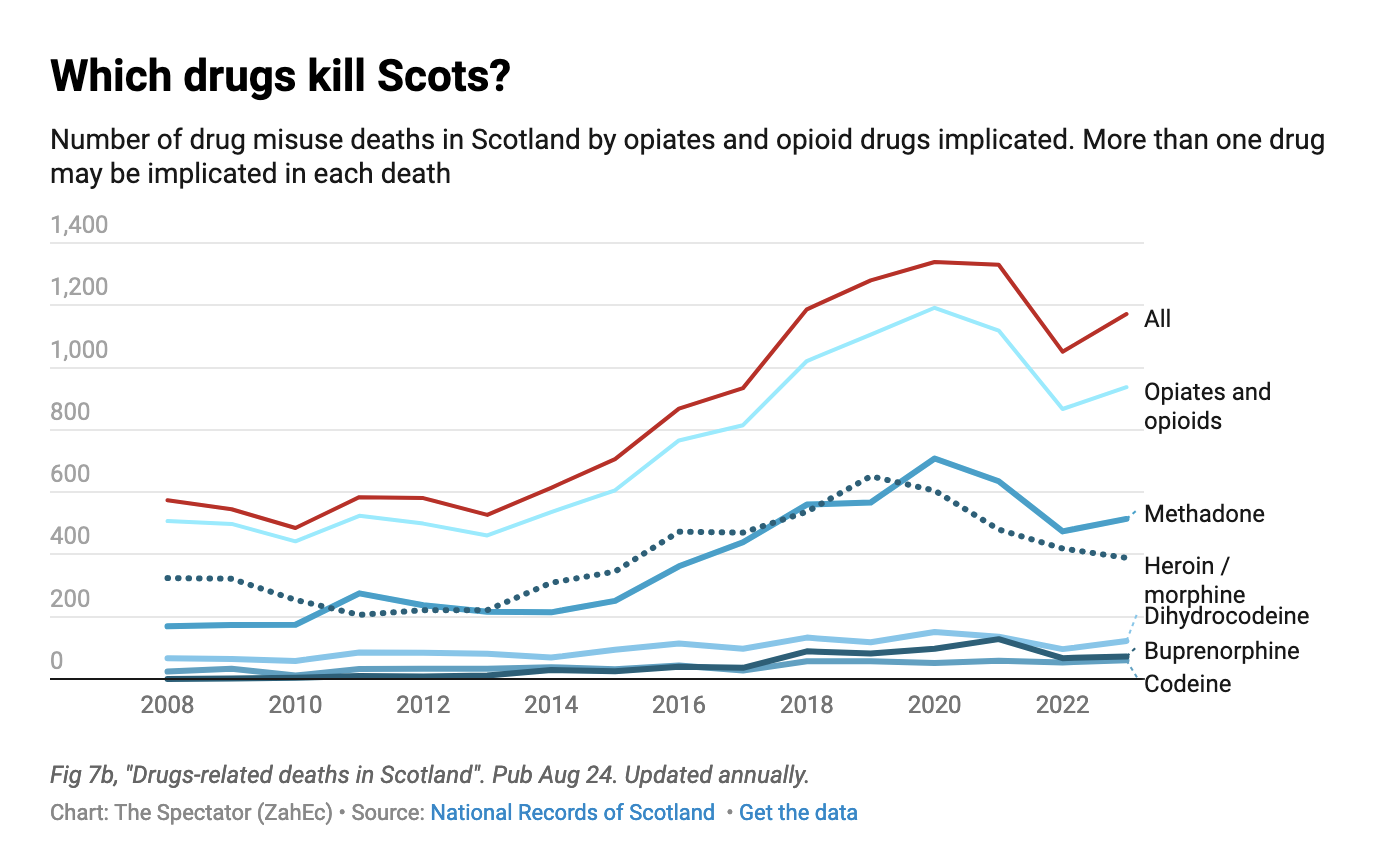Scotland’s drug misuse deaths – the worst in Europe – have long been a stain on the Scottish government’s record. Today it just got worse. The latest figures show a shocking 12 per cent increase in drug deaths to 1,172. It dashes hopes that last year’s dip in mortality showed that the problem was easing.

It’s all about poverty and deprivation, say politicians quoting the various drug charities who insist drug addiction should be treated as a social disease. But this doesn’t explain why the Scottish death rate is three times that of England’s. Scotland is not three times more deprived. Nor is it down to Westminster cuts, as nationalists invariably claim. Scotland continues to receive about 20 per cent more per head in public expenditure than England.
So what is to be done? Well, the Scottish government thought it had part of the answer three years ago when it opted to ‘remove the stigma of drug use’ by effectively decriminalising it. In September 2021 the Lord Advocate Dorothy Bain – a political appointee – said that those caught in possession with Class A drugs like heroin could be dealt with by a police warning rather than prosecution. This effectively turned Scotland into a national tolerance zone for hard drugs. And now it’s clear to see that the Scottish government’s magic bullet clearly hasn’t worked.

The Scottish government intends to double down on tolerance by opening drug consumption rooms for addicts to take their product in secure surroundings. The first of these so-called ‘shooting galleries’ will open in Glasgow in Autumn, and there will even be drug-checking facilities where addicts can check they are using the right stuff. Figures this year reveal that almost nine in ten drug deaths are classified as ‘accidental’ overdoses. The Scottish Tories and the Liberal Democrats are calling for more investment in drug rehabilitation, education and counselling while Conservative leadership candidate Murdo Fraser says there must be a ‘renewed focus’ on the Tories’ Right to Recovery Bill. Meanwhile SNP health secretary Neil Gray insists that the Scottish government is also spending record amounts on drug rehabilitation and treatment – but that doesn’t appear to be working.
This humane approach is very much in the spirit of the times. In recent years the ‘war on drugs’ has been abandoned by countries like Portugal and Canada, with very mixed results. However, just making life easier for drug addicts is not a solution to the problem. Indeed, decriminalisation arguably makes life easier for the drug gangs who make billions from this deadly trade. They typically distribute their product in the pockets of teenagers who carry only small amounts and can escape prosecution. Nor do their customers need to worry about the long arm of the law provided they only hold small quantities of their drug of choice.
Part of the problem is that the Scottish government is fighting, or rather not fighting, the last war. The mindsets of middle-aged ministers were formed by the ‘Trainspotting’ generation of heroin users in the 1990s, with the hope users would move on or die out. Interestingly, since 2000 the average age of drug deaths has increased from 32 to 45, pointing to an issue that remains tied to this generation, with male deaths driving the increase. But the growing problem today is an explosion in the use of crack cocaine and street benzos. And use of synthetic opioids like fentanyl, often cut with animal tranquillisers to produce the notorious drug cocktail known as ‘Zombie’, is on the rise. These offer cheap alternatives to alcohol, the increased minimum price of which has in Scotland led to a departure from supermarket shelves of strong ciders that used to offer the cheapest high on the street.

There is moreover an obvious contradiction between the government’s approach to removing the ‘stigma’ of drug addiction while also trying to prevent the spread of these deadly products in communities, some of which are now hosting the third generation of habitual substance abusers. Opponents of liberal drug policies have been marginalised in recent years, and the prevailing wisdom in the media and online is that drug addiction should be treated by addressing the social roots of the problem. That may well be true – research from the Royal College of Psychiatrists finds that Scotland’s higher rates of social deprivation, unemployment and poverty are unique drivers of the drug epidemic.
But just saying society is to blame isn’t good enough, not when the mortuaries of Scotland are being filled with young men and women – victims of the most insidious and lucrative businesses in the modern world.




















